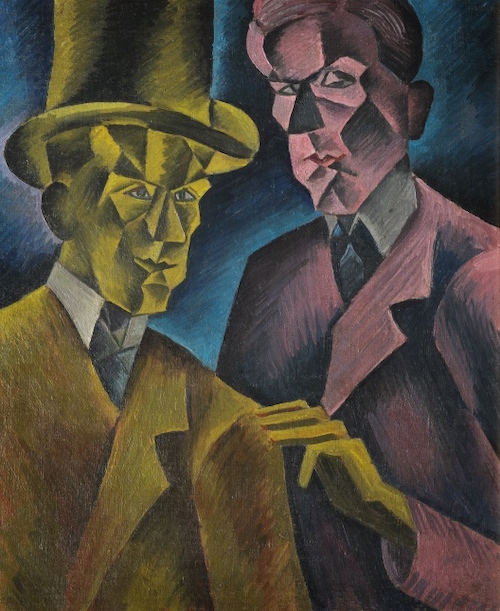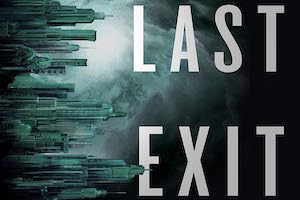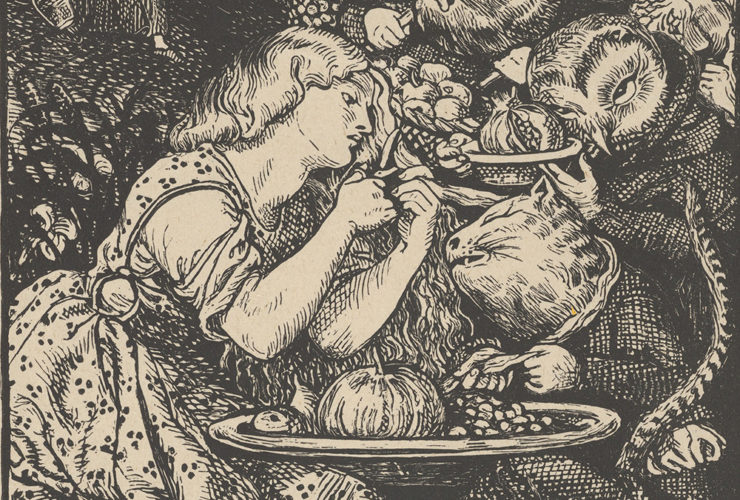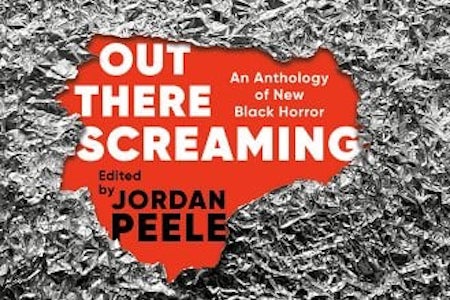Welcome back to Reading the Weird, in which we get girl cooties all over weird fiction, cosmic horror, and Lovecraftiana—from its historical roots through its most recent branches.
This week, we continue our celebration of National Poetry Month with Crystal Sidell’s “The Truth About Doppelgangers,” first published in March 2022 in Strange Horizons. Spoilers ahead, but go read! Content Warning: possible self-harm.
“I glimpsed their not-quite white saw-edged teeth in my peripheral vision, neatly filed and gleaming when I dared to look straight at them…”
An unnamed narrator, expert in the ways of doppelgangers, tells all about these treacherous “charmers.” You have to know what you’re looking for, otherwise you’ll never notice when “one of them passes you by in/the produce aisle, on a hiking trail, or on the/stairs at work.”
Always impeccably dressed, doppelgangers have a particular liking for dark red accessories. They also prefer dark red foods, like strawberries and apples, radishes and beets and flame grapes. They rouge their pale cheese with ground pomegranate seeds. “Minor, slanted things” give the charmers away.
You have to know what you’re looking for. The affinity for red things. The “seamless smiles.” The “measured words (largo and pianissimo)/as ensorcelling as their unearthly clear eyes.” The charmers survive by being excellent listeners, inviting “you to empty the contents of your/(un)troubled heart.”
Every forty seasons they shed their skins and “fold up like insects” in dark, abandoned places. When they break free from their crimson cocoons, they have no hearts (narrator has checked). No wonder they’re drawn to red, “—as if they can taste our/blood, our vitals, and pretend they have the one thing/they cannot make their own.”
“Come forth” and “Tell all” are the whispers with which they siphon out a “confidant’s” memories. They hunger most for “the naïve,/the altruistic, the unguarded.” They choose the “brightest, the loveliest, the most accomplished in/their field,” so they may go “soaring/high on the talents of those they have de-winged.” And when they look at the husks they’ve drained, they feel no remorse, only “cold curiosity.”
Buy the Book
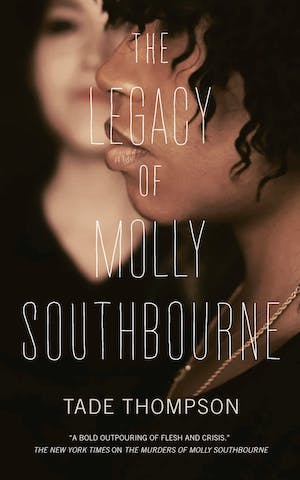

The Legacy of Molly Southbourne
The doppelgangers, the charmers, have “nothing to gain” from loners who “dream of chains, razors, split skins.” Narcissistic, they require an audience for the perfection of “outer form” it has cost them “untold life cycles” to perfect.
Trust the narrator. They’re everywhere, and narrator’s seen them “crumple the strongest mind like a sheet of paper,” good for nothing afterwards but the garbage bin. So if “you/want to navigate among charmers unscathed”, take the knife the narrator offers you and don’t hesitate to use it. “Wouldn’t want to end up in the trash, would you? This is your best chance. Remember this message.”
What’s Cyclopean: So many words for redness: garnet, carmine, cherry, ruby, sangria. Food and drink and jewels.
Weirdbuilding: Like more traditional vampires, the doppelgangers prefer still water. And suck—something—from the human heart.
Ruthanna’s Commentary
My favorite terrible fact is that every species of insect has at least one, usually more, species of parasitic wasp dedicated to making their lives hell. Forget about an inordinate fondness for beetles—beetles are at least shiny and not into mind control.
Which is to say, I have theories about the narrator of this poem.
Doppelgangers, huh? Per narrator, by their signs shall you know them. They love red in all its varieties, covet it as they covet boast-worthy lives and forms to steal. They’re good listeners, which as human-attraction methods go is considerably more effective than “mysterious beautiful woman on deserted road” and probably up there with magically-effective pheromones. We’re suckers for a chance to talk about ourselves.
But talking to these listeners is like answering a fairy who asks if they may have your name. They’ll suck out everything you offer, leaving a “husk.” Presumably then to go off bedecked in the contents of your heart. Because doppelgangers.
Except that I’m not convinced that the narrator has my best interests at heart either… so to speak. They tell us:
Charmers have nothing to gain from those who
work in solitary units; those who dream of
chains, razors, split skins, walls & floorboards covered insplotches of the richest red.
That sounds suspiciously like suicidal ideation to me. Doppelgangers want the people who know their own worth. They want to steal from “the brightest, the loveliest, the most accomplished,” to draw forth perfections they can boast about. It’s dangerous to boast, isn’t it? To tell people in your out-loud voice that you think well of yourself. Bad enough that a human might argue with you—but other things might be listening.
But if loving yourself attracts disaster, what’s the alternative? Here’s narrator now, with the alternative logical as an intrusive thought: Use that knife now. Cut out the beautiful and the worthwhile now, yourself, before something worse happens. Before someone takes your place. Trust me. Listen to me.
Or maybe I’m too suspicious. Maybe narrative is just urging you to use that knife on random people who like the color red. That would be fine, sure. “Don’t hesitate or you’ll make a mistake.” Which would definitely not be to narrator’s benefit either.
Narrator knows the color of doppelganger blood. Knows that they don’t have human hearts. They’ve checked. Unless they’re a cold-blooded little boy with extremely accurate intuition about what’s inside people’s bodies, that’s awfully suggestive. Emphasis on “awfully”.
So does narrator feed off the people the doppelgangers reject, and try to shift people from one prey pool to the other? Are they a doppelganger themselves, lying about their meal preferences? Or are they something else that relishes the non-hearts of well-fed doppelgangers? Do the doppelgangers exist at all? How many parasites do we need to worry about today, anyway?
The list of tempting red things—passed along by someone who describes the results of the proffered knife as “walls & floorboards covered in splotches of the richest red” puts me in mind of another poem about the danger of listening to strange monsters. Christina Rossetti reels off the wares of the goblin market:
Currants and gooseberries,
Bright-fire-like barberries,
Figs to fill your mouth,
Citrons from the South,
Sweet to tongue and sound to eye;
Come buy, come buy.
Caveat emptor!
Anne’s Commentary
I combed a bunch of recent SFF magazines in search of our second selection for April’s Poetry Month. My chief difficulty wasn’t finding weird poems—it was that the overall quality of the offerings made choosing just one difficult. Then my guardian ghoul came to the rescue and guided me to the March 28 2022 issue of Strange Horizons. My guardian ghoul knows just what I like: in this case, anything doppelganger and dramatic monologues in verse.
Sidell’s “Truth” adroitly combines the two.
Pressed to pick one poetic form as my favorite, I’d have to go with the dramatic monologue. Literary critic M. H. Abrams described its principal features as these: One person, not the poet but a fictional or historical character, narrates the whole of the poem; the narrator addresses and/or interacts with a specific auditor or audience; as or more important than the story the narrator tells is how story and voice reveal the narrator’s character. Arguably, at least in its Victorian heyday, the master of the form was Robert Browning. In “My Last Duchess,” a poem with nothing overtly weird about it, he conjures a narrator as chilling as any monster. Sidell’s poem may feature real monsters. By “real,” I mean nonhuman. Or its monster may be human. Or there may be both kinds of monsters, because as my old boss used to say: “Just because you have fleas doesn’t mean you don’t have ticks as well.”
It was fun to watch people start scratching themselves after he said that.
The narrator of “Truth” is not Crystal Sidell, the poet. I think. I hope. They are a self-proclaimed expert on doppelgangers who speaks to a poor sap of an auditor who doesn’t know what to look for and who therefore risks getting chucked into the garbage bin, husk drained of their identity. Narrator’s doppelganger, unlike the traditional version, doesn’t seem to exist alongside an identical person; in assuming a physical and psychic persona, it destroys the original. This makes it sound rather like a body-snatching pod person—and in fact, it does hibernate inside “a crimson shell of pumice-like material.” Sidell’s doppelganger is more vegetable than animal in its lack of a heart and its viscous green circulatory fluid. Worse, it suffers from a dangerous envy of human hearts and blood, hence its attraction to the color red, its affectation of red clothing, its consumption of red foodstuffs. According to narrator, it’s “as if they can taste our blood, our vitals, and pretend they have the one thing they cannot make their own.”
No more a traditional vampire than it is a traditional doppelganger, our monster-of-the-week recalls a couple vampires we’ve recently discussed. Like Carmilla, it radiates such personal allure that “charmer” is the name by which the narrator typically calls it. Very much like Leiber’s hungry-eyed Girl, it feeds not on blood but on the totality of a victim’s memories and emotions, the victim’s persona complete. The Girl doesn’t become her prey, however, nor does she want to. She’s a cold killer bred by an age of compulsive consumption. Whereas Carmilla, a product of the Romantic zeitgeist, is a tragic figure who never can “live in” her victim; by consummating her love, she loses her beloved.
The doppelganger’s charm, as far as the narrator can tell, is a hunting strategy refined over millennia of absorbing and imitating humans. It incubates in cold places. It has intellect—cold curiosity—but no remorse, no emotion. Yet it obsesses over RED, the warmest color, the color of warm blood pumped by a heart, the metaphoric seat of emotion. By wanting something it lacks, perhaps subconsciously, it approaches humanity. So, too, by its narcissism, its need for the recognition of its successes.
But who is there to applaud the doppelganger? It would take a peculiar sort of human to serve as its appreciative audience, even while purportedly deploring its actions and warning others against it. It would take another predator. It would take another monster.
It would take “Truth’s” narrator?
The question takes us back to the core features of dramatic monologue. The narrator has told us the story—a cautionary tale!—about doppelgangers. In doing so, they’ve also told us—a cautionary tale?—about themselves. Like maybe they’re unreliable? Delusional, paranoid, pick your diagnosis? Right off, they come across to me as a conspiracy theorist, the keeper of a secret the herd’s just not sharp-eyed and quick-witted enough to plumb, unlike the narrator. You have to know what you’re looking for. The narrator knows! The narrator knows the Truth.
Lucky you, they’re about to share the Truth at eloquent length. Please don’t squirm and shoot desperate glances around for rescue. What if the narrator is really conveying life-saving information to you about the doppelganger menace? What if they’re conveying life-saving information to you about themselves?
What if they’re doing both?
Just because you have fleas, remember? Well, just because someone’s insane doesn’t mean they can never be on to something. Something only the insane wouldn’t laugh off as obviously impossible instead of getting to the bottom of it.
Something, maybe, that the insane person was invited into, because they would be a safe witness or even a safe accomplice. Dracula doesn’t float outside Dr. Seward’s window to get access to the hospital; he floats outside Renfield’s.
Narrator points out that doppelgangers hunger for “the naive, the altruistic, the unguarded,” the ill-prepared, the innocent. In other words, for the easy victims. A doppelganger might have made a mistake in choosing the narrator for a “confidant,” or perhaps it was testing him for a certain sympathetic utility. Narrator’s description of how the charmer slips into a confidant’s “grey wrinkled warren” has the ring of personal experience. Yet the narrator has survived to tell the tale. How? Well, what if the charmer discovers that the confidant’s earliest childhood memories are “all saturated in red”? What if the confidant’s “respun” conversations are “letters clothespinned across a buzzing canvas of vermilion”? Charmers “have nothing to gain from those who/work in solitary units; those who dream of/chains, razors, split skins, walls & floorboards covered in/splotches of the richest red.”
Maybe they have nothing to gain from such humans as shells to abide in for forty seasons, but much to gain from them as kindred spirits, obsessed with all things red (what’s a richer red than blood?) Hunters with a canny preference for the unguarded, the naive, the quick to help a stranger. Predators without remorse, only the kind of “cold curiosity” that would “check” to make sure a doppelganger has no heart, only viscous green sap. Someone with an “(un)troubled heart”—the parentheses are telling of self-doubt. Someone who can admire the doppelganger’s “successful acclimation” into human society because they too are monster enough to have had to pull off the same deception.
Someone who’s a psychopath, a serial killer? Ready to arm their auditor with the knife that’s their best chance to avoid absorption by a doppelganger. But how is it the auditor’s best chance? Does the narrator intend them to use the knife to kill doppelgangers? Or to use it against other humans, thus proving themselves psychopathic enough to make a poor doppelganger victim but a good doppelganger ally?
By reading this dramatic monologue, you’ll have stood in for the narrator’s auditor. What do you think? Does the narrator have no external parasites, or just fleas, or both fleas and ticks?
Maybe they’ve got lice on top of the rest, plus a few leeches thrown in as lagniappe? Trust me, you just have to know what to look for.
Next week, we continue Joseph Sheridan Le Fanu’s Carmilla, Chapters 13-14, in which we continue the General’s tale of Millarca… Calmirla… Larmilca…
Ruthanna Emrys’s A Half-Built Garden comes out July 26th. She is also the author of the Innsmouth Legacy series, including Winter Tide and Deep Roots. Her short story collection, Imperfect Commentaries, is available from Lethe Press. You can find some of her fiction, weird and otherwise, on Tor.com, most recently “The Word of Flesh and Soul.” Ruthanna is online on Twitter and Patreon, and offline in a mysterious manor house with her large, chaotic, multi-species household outside Washington DC.
Anne M. Pillsworth’s short story “The Madonna of the Abattoir” appears on Tor.com. Her young adult Mythos novel, Summoned, is available from Tor Teen along with sequel Fathomless. She lives in Edgewood, a Victorian trolley car suburb of Providence, Rhode Island, uncomfortably near Joseph Curwen’s underground laboratory.










